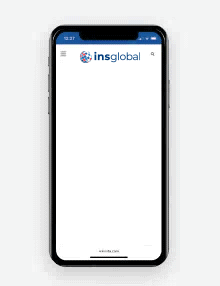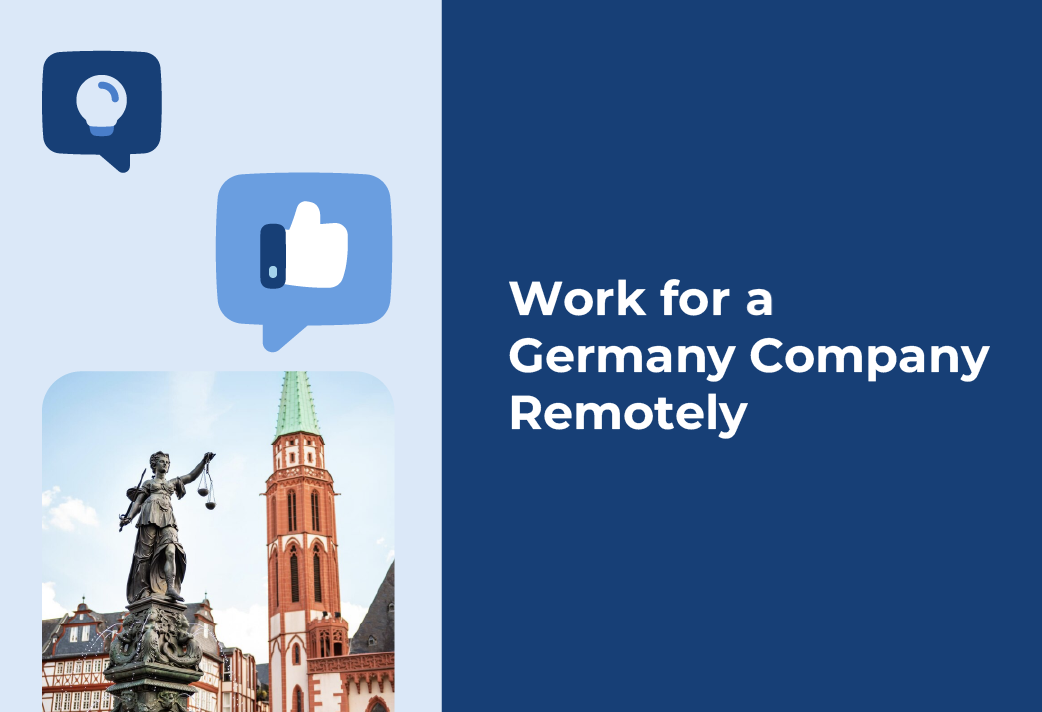The digital revolution has transformed the way we work, making it possible to work for companies across the globe without leaving your home country. This shift has opened up new opportunities for talent to work for companies in different countries, including Germany. If you’re considering the best way to work remotely for a German company, understanding the logistics, legalities, and potential challenges is crucial.
With advanced communication tools, collaborative software, and flexible working patterns, remote work has become the perfect option for many worldwide. So, whether you’re looking to work for a German company remotely or whether you already work for a German company looking to hire globally, this article will guide you through the ins and outs of remote work.

Tired of scrolling? Download a PDF version for easier offline reading and sharing with coworkers
Can I Work for a German Company Remotely from Overseas?
Simply put, yes, you can work for a German company remotely from anywhere in the world. Many German companies are open to hiring talent globally to get a full range of diverse skills and expertise, and there are safe and compliant ways to do this.
However, there are some factors to think about before you do this, including particular legal conditions, tax agreements, and German Labor Law.
To start with, working remotely for a German company means you need to comply with both your home country’s and Germany’s employment laws. This means being sure that you are properly classified as a worker in your country of residence as well as in Germany. This is to clarify your rights as a worker and your tax needs, as well as protect the company in Germany.
Traditionally, hiring workers overseas has required companies to open a new legal entity in the country where they wish to hire. This option is still possible, but it’s expensive and time-consuming. Instead, other options allow businesses to grow quickly and hire compliantly.
One common approach for the employer in Germany may be to hire you as an independent contractor. This simplifies some legal aspects but requires you to manage your taxes and benefits independently.
Alternatively, you can work for a German company remotely through an Employer of Record (EOR) service. This is an HR outsourcing option that handles the legal and administrative aspects of employment on the German company’s behalf, ensuring compliance with local laws in both countries.
How do Employer of Record Services Work?
An Employer of Record (EOR) is a third-party structure that becomes the official employer of workers on behalf of another company. Most commonly used to hire employees overseas, an EOR handles all employment-related tasks, including payroll, taxes, benefits, and compliance with local labor laws.
This arrangement allows companies to hire international employees without going through the hassles of establishing a legal entity in the employee’s country of residence.
In the case of a German company hiring overseas, an EOR service provider like INS Global manages the employment contract, employee onboarding, payroll processing, tax withholding, social security contributions, and any other legal requirements.
For the employee looking to work for a German company remotely, the EOR provides a seamless experience, allowing them to focus on their work without worrying about admin and legal problems.
Can I Work Remotely for a Company Through an EOR?
Yes, working remotely for a company through an EOR is a common practice today, with many global EOR service providers having been set up to help German companies.
For remote employees, this means they can work for a German company remotely in any country where an EOR provider offers their services without having to navigate the international employment issues themselves.
The EOR provides peace of mind through high-quality professional skills, knowledge, and tools and allows both employer and employee to focus on their jobs. This arrangement is ideal for companies looking to expand their global talent pool.
How Much Does an EOR Cost?
The cost of using an EOR varies depending on the services provided and the type of worker hired. Typically, EOR service providers charge a fee based on a percentage of the employee’s salary. Some EORs might also charge a flat monthly fee per employee. It’s always best to look for EOR service providers who will offer simple service costs up-front in order to avoid additional hidden fees further down the line.
Additional costs may include setup fees, extra benefits, and any other compliance requirements in the employee’s country of residence.
While using an EOR involves costs, it is often much cheaper and more cost-effective than setting up a legal entity in a foreign country due to the high initial costs as well as the need to hire local compliance specialists to manage functions for new hires.
Are There Limitations When Working Overseas for a German Company?
While working overseas for a German company offers many opportunities, there are also limitations and challenges to consider. Legal safety and tax compliance can be real concerns, as both employee and employer must be aware of and adhere to the rules of both the working country and Germany. This can involve complex tax filings and understanding different bilateral agreements or tax treaties.
Communication and time zone differences can also pose challenges. When someone works for a German company remotely, effective communication strategies are needed to bridge the gap caused by different working hours and cultural differences.
What are the Risks of Choosing to Work for a German Company Remotely?
Several risks are associated with choosing to work for a German company remotely, the first being tax compliance. Navigating the tax rules in both your home country and Germany can be complex, and failure to comply can result in fines or legal issues. Generally, this involves ensuring that there are licensed legal and tax experts familiar with the rules of both countries when you work for a German company remotely. However, this can quickly become expensive if the company works with employees in other countries in the same way.
Employment law compliance is another risk, as different countries may have varying labor laws. For example, misclassification of employment status in Germany (e.g., contractor vs. employee) is defined differently in some countries, and even small mistakes can lead to legal problems and financial penalties for both parties.
Added to this are concerns about ensuring data security and compliance with Germany’s stringent data protection laws (such as the GDPR). Today, these concerns are more crucial than ever when choosing to work for a German company remotely, thanks to evolving legal structures.
How INS Global’s Employer of Record Can Help Companies Work Worldwide
INS Global’s Employer of Record services provide a total and tailored solution for companies looking to hire talent in Germany or worldwide. By acting as the legal employer for overseas employees, INS Global handles all employment-related tasks, ensuring compliance with local laws and rules in 160+ countries worldwide.
Our comprehensive services and expert advisors simplify the process of hiring international employees, allowing companies to expand their global workforce without establishing a legal entity in each country.
INS Global manages payroll, tax compliance, social security contributions, and benefits, reducing the HR burden on the employer. For employees, INS Global provides a seamless and safe employment experience, allowing global talent to focus on strategically crucial work without worrying about day-to-day complexities.
Talk to our team of global expansion experts today to learn more about partnering with INS Global and accessing an increasingly interconnected world.
FAQ
Can I work for a German company in Spain?
Yes, you can work for a German company remotely while living in Spain. Spain, as a member of the EU, has relatively straightforward rules for working with companies in other EU countries. However, there are still important points to think about regarding tax and social security. This comes mainly from ensuring that you are properly identified as a legal employee in Spain, despite the fact that the company you work for is based in Germany.
If hired as an independent contractor to work for a German company remotely, you must still ensure you comply with Spanish tax laws and potentially register for VAT.
On the other hand, if employed through an EOR in Spain, the service will handle these aspects, ensuring you to work for a German company remotely while complying with Spanish and German regulations.
Can I live in Germany and work for a US company?
Living in Germany and working for a US company is also possible, and it is a popular scenario for many US expats. However, due to complex US requirements for overseas employees, this arrangement requires careful thought.
When working for a US company while living in Germany, you must determine your residency status for tax purposes. Germany typically taxes worldwide income for its residents, meaning you must report your US income to German tax authorities.
At the same time, the US also taxes its citizens on worldwide income, leading to potential double taxation. However, Germany and the US have a tax treaty to mitigate this issue, allowing you to avoid double taxation through foreign tax credits or exclusions, though it’s up to you and your employer to properly apply these exceptions.
An EOR in Germany can be key in this situation by handling the processes for tax compliance, payroll, and legal obligations for both countries.



PARTAGEZ